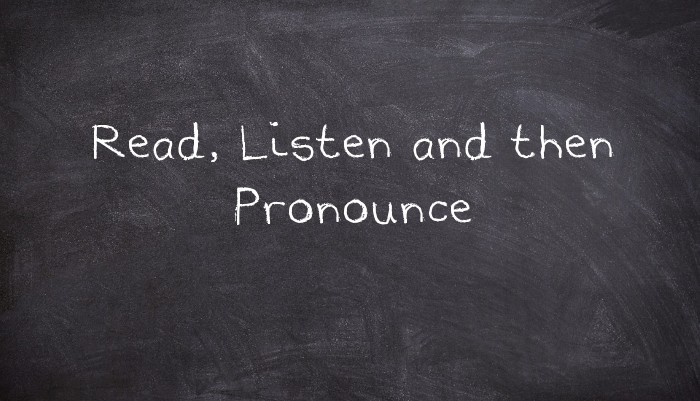
Read, Listen and then Pronounce
Forming good habits when learning English
Here is something which I am sure that any student will readily understand. Good and bad habits, once formed, are difficult to undo. It is hoped that the things which you learn in connection with reading, speaking and pronouncing English will be correct, because psychologists tell us that if you do a thing a certain way three times in succession, a habit will be formed which will be difficult to undo. After all, we may be intellectually superior to other animal species, but we are basically animals, and you will find that if you are training a dog, cat, horse etc, the same principles will apply. Perhaps you may give your pet dog a treat if they have done something the way you want them to do it three times, but, usually, after that they will continue using the habit which they have now acquired, without even thinking about it
You may be told that the best way to improve your English is to practise it every day. True, but what if you are practising something in the wrong way and nobody corrects you? You are reinforcing a bad habit which will become increasingly difficult to undo. I know this because I taught myself Italian from a book. I thought I was pronouncing some words correctly, but when I eventually spoke to Italians, when I came to the word which I was pronouncing incorrectly, it was soon apparent, from the look on their face, that I was not
Help with good habit formation
I have produced approximately 230 new poems in the English language and, at the request of local English children (who are learning English exactly as you are), I have put the poems onto my own internet website
The children asked me to add an accompanying voice recording to each poem because they discovered, as you will have discovered, that words that sound alike in English are not spelt the same way. Or to put it the other way, what you see written in English often gives you no clue as to how it sounds: Take these words for example, which all sound the same: off/cough; blue/through/too. Then look at these words which have similar spelling but all sound completely different: through; though; bough; cough; dough. Not one word in the last list sounds like any other in the list. So when you meet these words in a book, how on earth do you know how to pronounce them
You need to read and hear a word in English at the same time
The poems are freely available, and so are the voice recordings. I have put them there for your benefit. Many of the poems are fun story poems for children, because children are learning to speak and read English too. However, whether you are young or old, the poems will benefit you because they are short, fun and you have a variety of words that you would not normally find in many ESL books. The thing is that you will hear and read words in English together, and you will hear English written and spoken naturally as we native speakers speak it. I have been a teacher of business studies all my working life, but for 20 years I have worked with students from abroad, teaching them English. I know the problems you face. I would suggest that you take one poem a day. Read and listen to the poem at least three times. Make a note of the fact that there are words that sound alike but are spelt differently. The rhyming and rhythm of the poem will make it interesting and fun for you. As I read the words, please say them with me at the same time, noting my good English accent. I speak slowly and clearly because I have been a teacher and my students needed to understand every word I said. There is an advantage in not only being a poet, but also having an educational background. It is a good idea to learn the words of the poem and, away from the screen, say them to yourself on other occasions, perfecting your pronunciation

